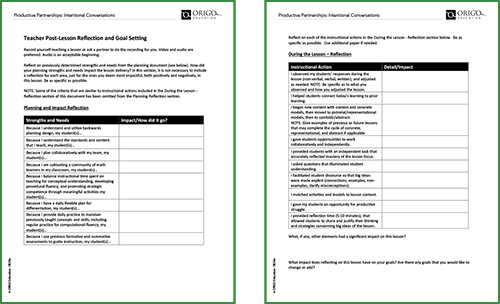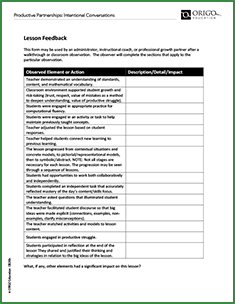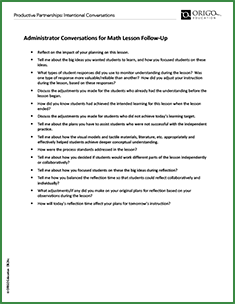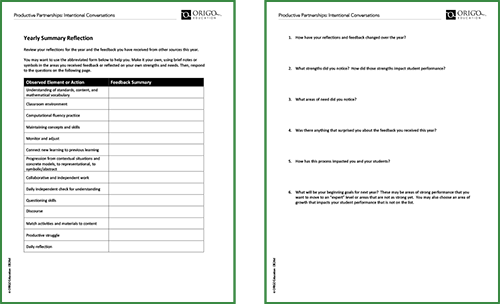Great Ideas
Productive Partnerships: Tools and Strategies for Intentional Conversations
Math Teacher Training Through Instruction Reflection – Part 3
This is the third in a series of articles about training and supporting teachers in math instruction:
- In the first article, we discussed instructional change in the math classroom
- In the previous article on math leadership, I discussed the importance of effective planning and provided tools and tips for teachers and administrators.
- In this article, I am providing tools for teachers to reflect on their instruction and for administrators to cultivate intentional conversations about the instruction. Watch this webinar for a more in-depth discussion.

As an instructional leader, I wanted to cultivate rich, intentional conversations after classroom observations. Additionally, I wanted some continuity from one classroom visit to the next. I remember feeling blessed when observation forms were placed in my box for signature with no conversation required. Now, I understand how much I could have benefitted from those conversations. Every educator deserves the opportunity for collegial relationships that offer a chance to grow professionally. Utilizing tools for reflection and feedback can offer direction to these professional partnerships.
What might some of these tools look like for elementary math teacher training for instruction improvement? I suggest the following suite:
- a self-evaluation tool for teachers to use for instruction
- a list of conversation starters that instructional leaders can pair with the tool above
- a tool for leaders or growth-partners to use for observation
- a tool for teachers to use to summarize their growth at the end of the year
These tools are a fusion of ideas and experience shared with many wonderful colleagues over a 30+ year career in education, as well as a synthesis of a wide range of literature I have read over the years (see specific acknowledgements below).
As I mentioned in the first article in this series, evaluating themselves and setting their own goals for improvement gives teachers ownership. While I did not have this specific tool when I was a principal, I used similar processes while I was in this role. I have found that most teachers are very accurate in identifying their own strengths and areas for improvement during these intentional conversations and are very enthusiastic about working toward goals that they own.
Teachers first record themselves teaching a lesson. A video recording is best. An audio recording made on their phone is an acceptable start. The recording is for their use alone unless they choose to share. Using the tool, teachers first consider how their planning affected the outcome of the lesson. Then, they reflect on additional instructional actions and their impact. Teachers have the opportunity to add other considerations and modify their goals. If leaders discover other common concerns, they may want to add these to the tool in the future, especially if these areas relate to a school or district initiative.

Teacher Post-Lesson Reflection and Goal Setting
At this stage, teachers may again ask for help from an instructional leader in an area they selected for growth. For instance, a fourth-grade teacher who is having difficulty matching models to instruction, might benefit from watching the series of six ORIGO One videos about fraction models. The first one is shown below.
Introducing fraction models from ORIGO Education on Vimeo.
If a teacher asks for help in finding appropriate methods for promoting fluency in multiplication the leader might direct the teacher to this webinar.
Leaders who are training or coaching can make the process more powerful by using a similar tool for feedback after walkthroughs or other observations. This tool may also be utilized by a growth-partner, another teacher who teams with a colleague to observe and offer feedback.

Lesson Feedback
During post-observation conversations, leaders and peers will discuss similarities and differences in the teacher’s self-reflection from their recording, and the observer’s reflection from the walkthrough. They will also want to talk about any other elements that may be affecting instruction as well as any changes needed in the teacher’s goals. Using the tool below will help focus the conversations.

Administrator Conversations for Math Lesson Follow-Up
Ideally this process will be repeated multiple times during the year. Teachers will record themselves and self-reflect. Leaders who are training or coaching and/or professional partners will perform walkthroughs or other observations and offer feedback.
At the end of the year, teachers will gather the feedback and reflect on the growth during the year and its impact on instruction and student success. They will begin the process of choosing goals for the following year.

Yearly Summary Reflection
During the course of these articles, I have mentioned the importance of training by supporting teachers in accomplishing their goals when they need assistance in achieving mastery. Hopefully, the strategies and tools provided help to cultivate productive partnerships that positively impacts student achievement.
Special thanks to Janeal Maxfield and Cristina Charney from North Thurston Public Schools and to Kirsten Danisavich from Worcester County Public Schools for their contributions to the tools in this blog. Thank you to Dr. Tammy Heflebower, contributing author to Becoming a Reflective Teacher, for helping to confirm and clarify my thoughts about supporting teacher growth.
Click HERE for the downloadable resources for this article!
About ORIGO Education
ORIGO Education is dedicated to making learning meaningful, enjoyable and accessible for all students with Pre-K and Elementary print and digital instructional materials, as well as professional learning for mathematics.
![]()




